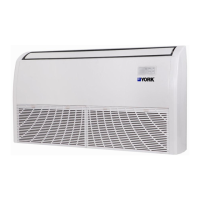Installation and Maintenance
10.5 Electrical installation
●
Use an ELB (Electric Leakage Breaker). If not used, it might cause an electric shock or
a fire.
● Do not operate the system until all the check points have been cleared.
20
Model
Capacity(Btu/h)
Power
Supply
ELB
Power Source
Cable Size
Transmitting Cable
Size
Nominal
Current(A)
Nominal
Sensitive
Current (mA)
En60 335-1
En60 335-1
18K 220-240V ~,50Hz 20 30
3 2 5mm
2
× . 4 1 5mm
2
× .
24K 220-240V ~,50Hz 32 30
3 2 5mm
2
× . 4 1 5mm
2
× .
36K 220-240V ~,50Hz 40 30
3 4 0mm
2
× . 4 1 5mm
2
× .
42K/48K/55K
380-415V 3N~,50Hz
32 30
5 2 5mm
2
× .
4 1 5mm
2
× .
Max. Running Current(A):REFER TO NAMEPLATE
NOTES:
1) Follow local codes and regulations when selecting field wires, and all the above are the minimum size.
2) The wire sizes marked in the table are selected at the maximum current of the unit according to the
European Standard , EN60335-1. Use the wires which are not lighter than the ordinary polychloroprene
sheathed flexible cord (code designation H07RN-F) .
When connecting the terminal block using flexible cord, make sure to use the round crimp-style terminal
for connection to the power supply terminal block.
Place the round crimp-style terminals on the wires up to the covered
part and secure in place.
When connecting the terminal block using a single core
wire, be sure to perform curing.
3) When transmitting cable length is more than 15 meters, a larger wire size should be selected.
4) Use a shielded cable for the transmitting circuit and connect it to ground .
Flexible cord
covered part
Round crimp style terminal
-
Terminal
Single core wire
5) In the case that power cables are connected in series, add each unit maximum current and select
wires below.
*In the case that current exceeds 63A, do not connect cables in series.
Current i(A)
2
Wire Size(mm)
i 6≤ 0 75.
6 i 10<≤ 1
10 i 16<≤ 1 5.
16 i 25<≤ 2 5.
25 i 32<≤ 4
32 i 40<≤ 6
40 i 63<≤ 10
63 i<
*
Selection According to EN60335-1
(A) Check to ensure that the insulation resistance is more than 2 MΩ , by measuring the resistance
between ground and the terminal of the electrical parts. If not, do not operate the system until the
electrical leakage is found and repaired.
(B) Check to ensure that the stop valves of the outdoor unit are fully opened and then start the system.

